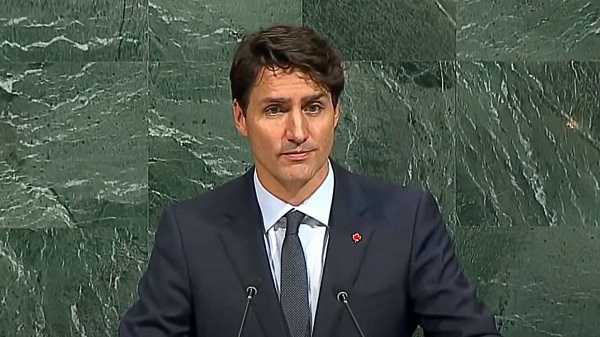Internet
Canada’s Censorship Crusade Targets Tech Giants in a Push for “Disinformation” Control

A flurry of controversial bills in Canada, some of which became law, serve to cement this impression.
Now, as President Trump prepares to start his second term in office in the US, Canada’s “orphaned” ruling class continues with the “disinformation” narrative – either as a sign of long-term commitment or looking for new “disinformation partners” elsewhere in the world – or simply as a sign of inertia.
Time will tell, and it will be interesting to see, but for the moment, news out of Canada speaks about a report compiled by the House of Commons Heritage Committee, titled, “Tech Giants’ Intimidation and Subversion Tactics to Evade Regulation in Canada and Globally.”
How about the tactics deployed in Canada – and globally – using all manner of intimidation and subversion to evade citizens’ right to free speech?
Maybe another day, by another ruling coalition.
Right now, the Liberals, the New Democratic Party, and Bloc Québécois stand behind statements such as this one, found in the cumbersomely-named report:
“The Government of Canada notes some individuals and groups create disinformation to promote political ideologies including extremist views and conspiracy theories or simply to make money.”
This looks like a call to combine (yet more) censorship with (yet more) deplatforming. And the ones to “fix” things for Canada’s current government are companies behind major social platforms, like Meta and Google.
But the group of Canada’s MPs behind the report believes so.
They want mechanisms put in place “to detect undesirable or questionable content that may be the product of disinformation or foreign interference and that these platforms be required to promptly identify such content and report it to users.”
Does Canadian parliament’s pressure on US tech companies not count as “foreign interference”? Unclear. Another thing that’s unclear – as in, undefined in the report – is what its authors have in mind when they mention “disinformation” and, “conspiracy theories.”
It’s as if these terms have become “art for art’s sake.”
Whatever that may be, Canada’s ruling parliamentarians want specific actions against these undefined phenomena to be enforced by tech companies.
“Failure to do so should result in penalties,” reads the document.
Business
Vice President Vance expects framework of TikTok deal by April 5

 MxM News
MxM News
Quick Hit:
Vice President JD Vance expects a framework agreement to resolve TikTok’s ownership by April 5, as the Biden-era law requiring its Chinese owner, ByteDance, to sell the app or face a ban looms. President Donald Trump had previously delayed enforcement of the law, allowing more time for negotiations. The White House is in discussions with multiple potential buyers to establish an American-owned version of the social media platform.
Key Details:
-
Vice President Vance stated that a high-level agreement will likely be reached that meets national security concerns while creating a U.S.-based TikTok enterprise.
-
President Trump signed an executive order in January, delaying the enforcement of a law requiring ByteDance to sell TikTok or face a ban.
-
The White House is engaged with four interested groups in potential acquisition talks.
Diving Deeper:
The fate of TikTok in the U.S. has been a subject of intense debate due to concerns over data security and its ties to the Chinese Communist Party through ByteDance. The law, originally passed under the Biden administration, sought to force the sale of the app due to fears that American user data could be accessed by the Chinese government. However, after taking office, President Trump extended the enforcement deadline by 75 days, giving room for negotiations.
Vice President Vance, speaking to NBC News aboard Air Force Two, expressed confidence that an agreement will be reached by April 5, though some details may still need to be finalized afterward. He and national security adviser Michael Waltz have been leading efforts to facilitate a sale that would address national security concerns while preserving TikTok’s massive American user base.
President Trump revealed last weekend that his administration is in talks with four different groups interested in acquiring the app. While the specifics of these negotiations remain undisclosed, the administration has made it clear that TikTok must operate as a distinct American entity to remain in the U.S. market.
As the deadline approaches, ByteDance has not publicly commented on the ongoing discussions. However, with bipartisan concerns over the influence of the Chinese Communist Party on U.S. technology platforms, the expectation is that any deal will include significant safeguards to prevent foreign interference in the app’s operations.
The coming weeks will determine whether a sale materializes or if further action will be needed to enforce the law. Either way, the Trump administration has signaled its commitment to ensuring that TikTok is no longer under the control of a hostile foreign adversary.
Business
38 state AGs, DoJ announce plan to end Google’s search monopoly

 MxM News
MxM News
Quick Hit:
A coalition of 38 state attorneys general, alongside the Department of Justice (DOJ), has announced a final plan to break up Google’s search engine monopoly. The proposed remedies include forcing Google to divest its Chrome browser and, potentially, its Android operating system. The move follows a court ruling last year that found Google guilty of monopolistic practices in online search.
Key Details:
- The plan would require Google to sell Chrome and could extend to Android if initial measures fail.
- The initiative aims to restore competition in the search and search advertising markets, according to Colorado AG Phil Weiser.
- Google argues the DOJ’s proposal is overly aggressive and claims it would harm consumers and U.S. technology leadership.
Diving Deeper:
The Justice Department and 38 state attorneys general have put forward a final set of remedies aimed at dismantling Google’s dominance in online search and digital advertising. The proposal, announced by Colorado Attorney General Phil Weiser, seeks to correct years of alleged anti-competitive behavior by the tech giant.
“For years, the Google browser has been the dominant gateway for users to search the internet,” Weiser said, emphasizing that Google’s monopolistic grip has “stifled innovation, undermined competition, and harmed consumers.” The coalition’s proposed remedies focus on breaking up Google’s search empire to promote a more competitive marketplace.
One of the most significant aspects of the proposal is the forced divestiture of Google’s Chrome browser, which currently serves as the primary access point for billions of users. Additionally, if Google is found to be undermining the decree’s effectiveness, the company could also be required to sell off Android, further reducing its influence over digital search.
This aggressive action follows a federal court ruling last year that determined Google had engaged in monopolistic practices. The ruling came after extensive legal battles between the government and the tech giant, reinforcing concerns that Google’s dominance in online search has hurt competition and limited consumer choice.
However, Google has strongly pushed back against the proposal. Lee-Anne Mulholland, the company’s vice president of regulatory affairs, criticized the DOJ’s intervention, calling it an overreach. “DOJ’s proposal would harm American consumers and undermine America’s global technology leadership,” Mulholland said, signaling the company’s intent to challenge the ruling in court.
A court hearing on the proposed remedies is set to begin on April 21 and is expected to conclude by May 9. Google has already indicated that it will appeal any ruling that forces it to break up its core business, setting the stage for another high-stakes legal battle between the tech giant and federal regulators.
-

 2025 Federal Election1 day ago
2025 Federal Election1 day agoPoilievre refuses to bash Trump via trick question, says it’s possible to work with him and be ‘firm’
-

 2025 Federal Election2 days ago
2025 Federal Election2 days agoPoilievre to let working seniors keep more of their money
-

 2025 Federal Election2 days ago
2025 Federal Election2 days agoVoters should remember Canada has other problems beyond Trump’s tariffs
-

 Community2 days ago
Community2 days agoSupport local healthcare while winning amazing prizes!
-

 COVID-191 day ago
COVID-191 day ago17-year-old died after taking COVID shot, but Ontario judge denies his family’s liability claim
-

 Daily Caller2 days ago
Daily Caller2 days agoCover up of a Department of Energy Study Might Be The Biggest Stain On Biden Admin’s Legacy
-

 International2 days ago
International2 days agoVice President Vance, Second Lady to visit Greenland on Friday
-

 Business1 day ago
Business1 day agoWhile “Team Canada” attacks Trump for election points, Premier Danielle Smith advocates for future trade relations
 By
By 



